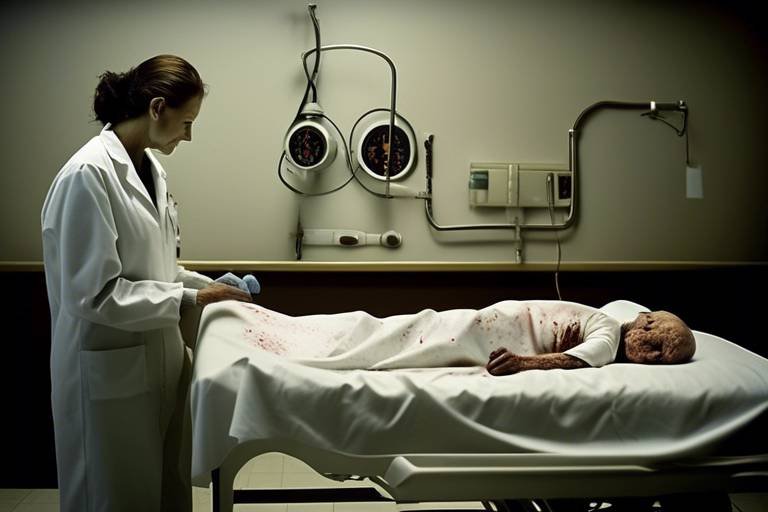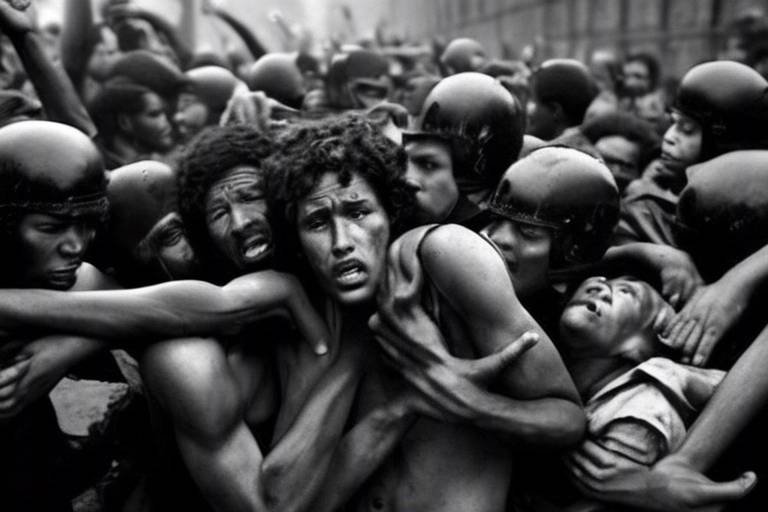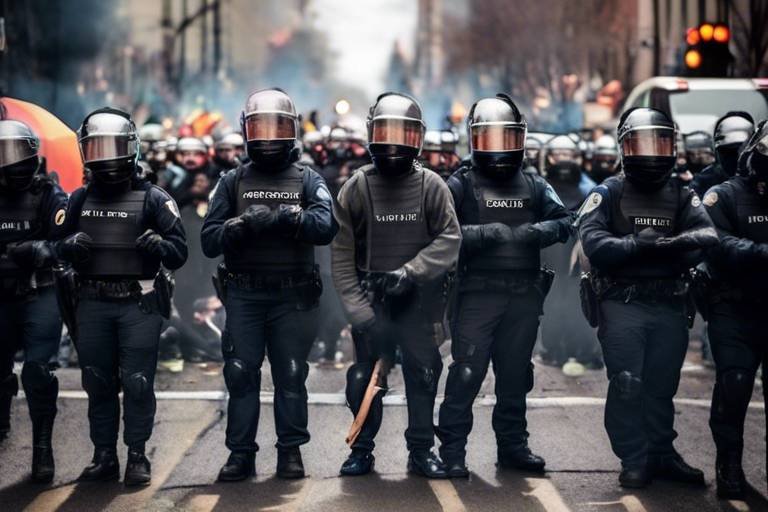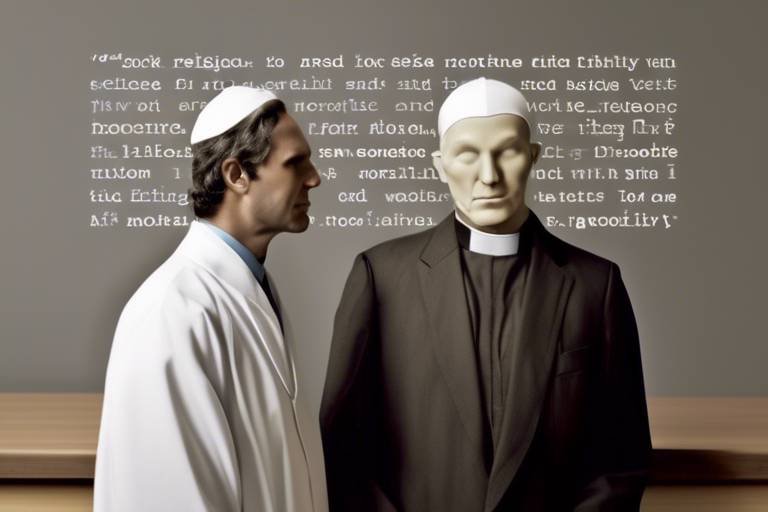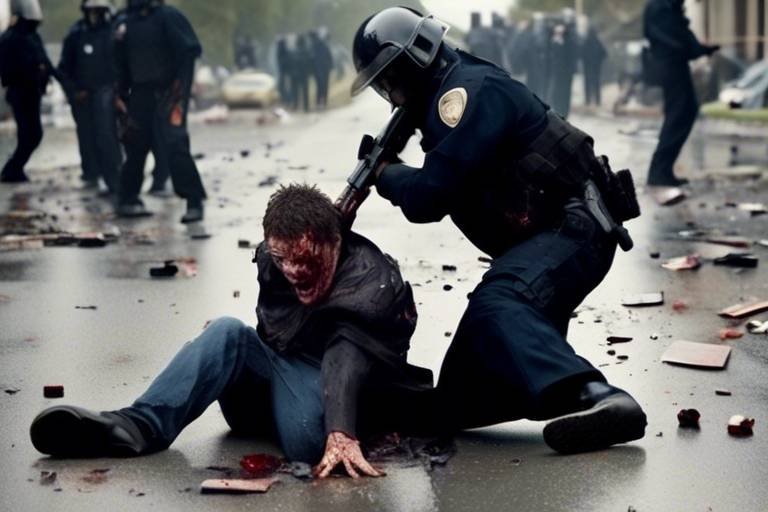Analyzing the Morality of Euthanasia
Euthanasia is a term that evokes a whirlwind of emotions and opinions. It's a subject that dances on the delicate line between compassion and ethical dilemmas. At its core, euthanasia refers to the practice of intentionally ending a person's life to relieve them of suffering, particularly in cases of terminal illness or unbearable pain. But, why does such a straightforward concept spark such heated debates? The answer lies in the intricate web of moral, ethical, and societal factors that intertwine to shape our understanding of this sensitive issue.
When we delve into the morality of euthanasia, we uncover a spectrum of perspectives that range from staunch support to vehement opposition. It's not just about the act itself but also about the underlying values that inform our beliefs. For instance, some argue that allowing individuals to choose to end their suffering is an act of mercy, while others contend that it undermines the sanctity of life. This dichotomy raises critical questions: Should individuals have the right to decide when to die? Does alleviating suffering justify taking a life? These questions are central to the ongoing discourse surrounding euthanasia and its moral implications.
Moreover, the conversation is further complicated by the intersection of personal beliefs, cultural norms, and legal frameworks. Different societies view euthanasia through varied lenses, influenced by historical context and prevailing ethical theories. As we explore these dimensions, we can better understand how morality is not a one-size-fits-all concept but rather a tapestry woven from the threads of human experience and philosophical inquiry.
Ultimately, analyzing the morality of euthanasia is not just an academic exercise; it is a deeply personal journey that reflects our values, fears, and hopes. As we navigate this complex landscape, it is essential to engage in open dialogue, fostering understanding and empathy for those affected by the choices surrounding end-of-life care. In doing so, we honor the humanity of all involved, acknowledging that this is not merely a question of right or wrong, but a profound exploration of what it means to live—and to die—with dignity.
Understanding euthanasia requires a clear definition, distinguishing it from related concepts like assisted suicide and palliative care, which is crucial for informed discussions on its moral implications.
The history of euthanasia reveals its evolving perception across cultures and eras, highlighting significant legal and ethical milestones that have shaped contemporary debates on its morality.
Different ethical frameworks, such as utilitarianism and deontology, provide distinct perspectives on euthanasia, influencing opinions on its moral acceptability and the rights of individuals to choose death.
Utilitarianism advocates for actions that maximize overall happiness, prompting discussions on whether euthanasia can be justified if it alleviates suffering for both patients and their families.
Deontological ethics focuses on the morality of actions themselves, raising questions about the inherent value of life and whether euthanasia violates moral duties to preserve life.
Religious beliefs significantly influence opinions on euthanasia, with various faiths offering differing interpretations of the sanctity of life and the morality of ending suffering through death.
The legality of euthanasia varies globally, reflecting cultural attitudes and ethical considerations, which impact how societies approach the topic and the rights of individuals seeking euthanasia.
Euthanasia poses ethical dilemmas for healthcare professionals, who must navigate their moral beliefs, patient autonomy, and the implications of participating in end-of-life decisions.
- What is the difference between euthanasia and assisted suicide? Euthanasia involves a healthcare professional directly administering a substance to end a patient's life, while assisted suicide refers to a patient self-administering a lethal substance with the help of a healthcare provider.
- Is euthanasia legal in any countries? Yes, euthanasia is legal in several countries, including Belgium, the Netherlands, and Canada, each with specific regulations governing its practice.
- How do healthcare professionals handle requests for euthanasia? Healthcare professionals must consider legal, ethical, and personal factors, often involving ethical committees and discussions with patients and families.
- What are the arguments against euthanasia? Opponents argue that it undermines the sanctity of life, could lead to potential abuses, and may pressure vulnerable individuals into choosing death over living with pain.

The Definition of Euthanasia
Understanding euthanasia is essential for engaging in informed discussions about its moral implications. At its core, euthanasia refers to the practice of intentionally ending a person's life to relieve them from suffering, particularly in cases of terminal illness or severe pain. However, this definition can be nuanced, and it's crucial to distinguish euthanasia from related concepts such as assisted suicide and palliative care.
Euthanasia can be categorized into several types, primarily:
- Voluntary Euthanasia: This occurs when a competent individual makes a conscious decision to end their life, often through the assistance of a healthcare professional.
- Non-Voluntary Euthanasia: In this situation, the decision is made on behalf of an individual who is unable to provide consent, such as those in a coma.
- Involuntary Euthanasia: This refers to ending a life against the individual's wishes, which raises significant ethical concerns and is generally considered murder.
On the other hand, assisted suicide involves providing a person with the means to end their own life, typically through prescribed medication, but without the direct act of killing. Meanwhile, palliative care focuses on providing relief from the symptoms and stress of a serious illness, aiming to improve the quality of life without hastening death.
The distinctions between these terms are not merely academic; they have profound implications for legal, ethical, and personal decisions surrounding end-of-life care. For instance, while euthanasia may be viewed as a compassionate choice in alleviating suffering, it also raises questions about the sanctity of life and the moral responsibilities of healthcare providers.
In summary, the definition of euthanasia encompasses a range of practices aimed at ending suffering, but it is essential to approach the topic with a clear understanding of the different forms it can take. This clarity not only aids in personal reflection but also fosters a more informed dialogue within society about the ethical implications of choosing death as a means to alleviate suffering.
- What is the difference between euthanasia and assisted suicide? Euthanasia involves a healthcare professional actively ending a patient's life, while assisted suicide means providing the means for the patient to end their own life.
- Is euthanasia legal everywhere? No, the legality of euthanasia varies by country and region, with some places allowing it under strict regulations while others prohibit it entirely.
- What ethical dilemmas do healthcare professionals face regarding euthanasia? Healthcare professionals must balance their moral beliefs, patient autonomy, and the implications of participating in end-of-life decisions, often leading to significant emotional and ethical challenges.

Historical Context
The journey of euthanasia through history is a fascinating tapestry woven with threads of culture, ethics, and law. To truly understand the moral implications of euthanasia today, we must first explore how perceptions have shifted over time. In ancient societies, such as Greece and Rome, the practice of euthanasia was often viewed through the lens of personal honor and dignity. It was not uncommon for individuals facing insurmountable suffering to seek a dignified exit from life, often with the acceptance of their community. However, as time progressed, particularly during the Middle Ages, the prevailing religious ideologies began to dominate ethical discussions. The sanctity of life became a cornerstone of moral philosophy, leading many to view euthanasia as morally unacceptable.
Fast forward to the 19th and 20th centuries, and we witness a dramatic shift in attitudes. The rise of modern medicine brought about new ethical dilemmas. Patients began to expect not just care, but a quality of life that was often unattainable in the face of terminal illness. This period saw the emergence of palliative care, which aimed to alleviate suffering without hastening death. Yet, as medical advancements continued, so did the debates surrounding euthanasia. In the Netherlands, the first legal framework for euthanasia was established in 2002, marking a significant milestone in the global conversation about the right to die.
Throughout history, various legal and ethical milestones have shaped the contemporary landscape of euthanasia. Key moments include:
- 1976: The case of Karen Ann Quinlan in the United States sparked national debates about the right to die and the role of medical professionals in end-of-life decisions.
- 1997: Oregon became the first U.S. state to legalize physician-assisted suicide, setting a precedent for similar laws across the country.
- 2002: The Netherlands legalized euthanasia, becoming the first country to do so, thereby influencing global perspectives on the issue.
Today, the historical context of euthanasia serves as a backdrop for ongoing discussions about morality, legality, and personal choice. It is essential to recognize that the evolving perceptions are not merely academic; they reflect the struggles of individuals and families grappling with profound ethical dilemmas. As we continue to navigate this sensitive issue, understanding the past can provide valuable insights into the future of euthanasia and its moral implications.
- What is euthanasia? Euthanasia is the practice of intentionally ending a person's life to relieve suffering, often associated with terminal illness.
- How does euthanasia differ from assisted suicide? In euthanasia, a medical professional administers the means to end life, whereas in assisted suicide, the individual self-administers the medication.
- Is euthanasia legal everywhere? No, the legality of euthanasia varies by country and region, with some places allowing it under specific circumstances while others prohibit it entirely.
- What are the ethical concerns surrounding euthanasia? Ethical concerns include the sanctity of life, the potential for abuse, and the moral duties of healthcare professionals.

Ethical Theories and Euthanasia
When diving into the murky waters of euthanasia, it’s crucial to understand the ethical frameworks that shape our perceptions and decisions. Different ethical theories provide varied lenses through which we can examine the morality of ending a life to alleviate suffering. Among these theories, utilitarianism and deontology stand out as two prominent approaches that often clash in the context of euthanasia.
Utilitarianism is all about the greater good. It posits that the right action is the one that maximizes overall happiness and minimizes suffering. In the context of euthanasia, utilitarian thinkers might argue that if ending a life can relieve unbearable pain for a patient, then it could be justified. Imagine a scenario where a terminally ill patient is in constant agony; the utilitarian perspective would advocate for euthanasia as a means to not only alleviate the patient's suffering but also to spare their family from the emotional toll of prolonged grief. Thus, the argument unfolds:
- Does euthanasia relieve suffering?
- Can it bring peace to families burdened by watching their loved ones suffer?
- Is the temporary pain of losing a loved one outweighed by the relief of their suffering?
However, the conversation doesn’t stop there. Enter deontological ethics, which flips the script entirely. Unlike utilitarianism, deontology emphasizes the morality of the actions themselves rather than the consequences. It raises profound questions about the inherent value of life. From this viewpoint, euthanasia could be seen as a violation of a moral duty to preserve life. For instance, many deontologists would argue that taking a life, even to alleviate suffering, is inherently wrong because it goes against the fundamental principle of respecting life. This perspective often leads to a dilemma: can one ever justify euthanasia if it means violating a core moral obligation?
As we navigate these ethical theories, it becomes clear that they not only influence our personal beliefs but also shape societal norms and laws surrounding euthanasia. The tension between these frameworks creates a rich tapestry of debate, as people grapple with questions like:
- Should the right to choose death be considered an extension of personal freedom?
- What responsibilities do healthcare providers have in these situations?
- How do we balance compassion with moral duties?
In summary, the ethical theories surrounding euthanasia present a complex interplay of ideas that challenge our understanding of morality, autonomy, and the essence of life itself. Whether one leans towards the utilitarian view of maximizing happiness or the deontological perspective of respecting life, the debate remains heated and deeply personal for many. As society continues to evolve, so too will the discussions about euthanasia, making it essential to engage with these ethical frameworks thoughtfully and compassionately.
Q: What is euthanasia?
A: Euthanasia refers to the practice of intentionally ending a person's life to relieve suffering, often in cases of terminal illness.
Q: How does utilitarianism view euthanasia?
A: Utilitarianism supports euthanasia if it leads to a greater overall happiness and reduces suffering for the patient and their family.
Q: What is the deontological stance on euthanasia?
A: Deontological ethics typically opposes euthanasia, emphasizing the moral duty to preserve life regardless of the consequences.
Q: How do religious beliefs influence views on euthanasia?
A: Many religions hold varying beliefs about the sanctity of life, which significantly impacts their stance on euthanasia and end-of-life decisions.
Q: What is the legal status of euthanasia around the world?
A: The legality of euthanasia varies by country, reflecting cultural attitudes and ethical considerations regarding individual rights and medical practices.

Utilitarian Perspective
When diving into the murky waters of euthanasia from a , we’re essentially asking a fundamental question: does the action lead to the greatest happiness for the greatest number? Utilitarianism, a philosophy rooted in the idea of maximizing overall well-being, prompts us to consider the implications of euthanasia not just for the individual, but for society as a whole. Imagine a scenario where a terminally ill patient is enduring unbearable pain. The choice to end their suffering through euthanasia could be seen as a compassionate act that not only liberates the patient from their agony but also alleviates the emotional and financial burdens on their family. In this light, euthanasia could be justified as a means to enhance overall happiness.
However, the discussion doesn’t stop at individual circumstances. We must also consider the broader societal impacts. For instance, if euthanasia were widely accepted, could it potentially lead to a slippery slope where the value of life is diminished? Would vulnerable populations, such as the elderly or disabled, feel pressured to choose euthanasia to avoid being a burden? These are critical questions that utilitarian thinkers grapple with. The balance between alleviating suffering and ensuring the sanctity of life is a delicate one, and it requires a careful analysis of the potential outcomes.
Utilitarianism encourages us to weigh the pros and cons of euthanasia with a focus on overall consequences. Here are a few points that highlight this perspective:
- Alleviation of Suffering: Euthanasia can provide relief from intolerable pain and suffering, leading to a more humane end-of-life experience.
- Emotional Relief for Families: The decision to end suffering can also ease the emotional burden on family members, allowing them to remember their loved ones in a more positive light.
- Resource Allocation: In some cases, euthanasia can free up medical resources for patients who have a better chance of recovery, thus maximizing the overall utility of healthcare systems.
Yet, the utilitarian perspective is not without its critics. Opponents argue that the potential for abuse and the risk of coercion cannot be ignored. They caution against a society that might prioritize efficiency over empathy, where the decision to die could be influenced by external pressures rather than genuine personal choice. The ethical dilemma here is profound: how do we ensure that the choice of euthanasia remains a truly voluntary one, free from societal or familial expectations? This is where the conversation becomes complex, reflecting the multifaceted nature of human values and the sanctity of life.
Ultimately, the utilitarian perspective on euthanasia invites us to engage in a nuanced dialogue about the nature of suffering, the value of life, and the role of compassion in our decision-making processes. It challenges us to consider not just the immediate impacts of euthanasia, but its long-term implications for individuals and society alike. As we navigate these waters, it’s essential to remain open to the diverse opinions that shape this ongoing debate.
1. What is euthanasia?
Euthanasia refers to the practice of intentionally ending a person's life to relieve them from suffering, typically in cases of terminal illness.
2. How does utilitarianism justify euthanasia?
Utilitarianism justifies euthanasia by arguing that it can lead to the greatest happiness for the greatest number, alleviating suffering for both the patient and their loved ones.
3. What are some concerns regarding euthanasia?
Concerns include the potential for abuse, the risk of coercion, and the ethical implications of valuing life differently based on circumstances.
4. Is euthanasia legal everywhere?
No, the legality of euthanasia varies significantly around the world, with some countries allowing it under strict regulations, while others prohibit it entirely.

Deontological Perspective
When we dive into the on euthanasia, we're stepping into a realm where the morality of actions takes center stage. Deontological ethics, primarily associated with the philosopher Immanuel Kant, posits that certain actions are inherently right or wrong, regardless of their outcomes. This means that the act of ending a life, even if it is to alleviate suffering, raises serious moral questions. Advocates of this view argue that life has an intrinsic value that must be respected and preserved. They contend that euthanasia undermines this value, as it involves deliberately ending a life, which is seen as a violation of a fundamental moral duty.
One key aspect of deontological ethics is the concept of moral duties. For instance, many deontologists believe that we have a duty to protect life and not to harm others. This leads to a critical question: does the act of euthanasia violate this duty? To those who hold this belief, the answer is a resounding yes. They argue that allowing euthanasia could create a slippery slope, where the sanctity of life is increasingly compromised. This concern is compounded by the idea that vulnerable individuals might feel pressured to choose euthanasia, thinking they are a burden to their families or society.
Moreover, the deontological perspective emphasizes the importance of intentions behind an action. In this framework, the intention to end suffering, while noble, cannot justify the act of killing. For many deontologists, the moral integrity of the act itself is what matters most. This leads to a stark contrast with the utilitarian approach, which focuses on the outcomes rather than the actions themselves. To illustrate this, consider the following table that summarizes the differences between these two ethical frameworks:
| Aspect | Deontological Ethics | Utilitarian Ethics |
|---|---|---|
| Focus | Morality of actions | Consequences of actions |
| Key Principle | Duty and obligation | Maximizing happiness |
| View on Euthanasia | Generally opposed | Potentially justified if it reduces suffering |
In conclusion, the deontological perspective presents a compelling argument against euthanasia. It challenges us to consider the moral implications of our choices, urging a respect for life that transcends individual circumstances. While the desire to alleviate suffering is undeniably important, the deontological view insists that we must also consider the broader moral landscape. In a world where ethical dilemmas abound, this perspective serves as a reminder of the weight that our actions carry, encouraging us to reflect on the principles that guide our decisions.
- What is the main argument against euthanasia from a deontological perspective?
The main argument is that euthanasia violates the inherent value of life and moral duties to preserve it.
- How does deontological ethics differ from utilitarianism?
Deontological ethics focuses on the morality of actions themselves, while utilitarianism emphasizes the outcomes and overall happiness resulting from those actions.
- What are some potential consequences of legalizing euthanasia according to deontologists?
Deontologists warn that legalizing euthanasia could lead to a slippery slope where the sanctity of life is undermined and vulnerable individuals may feel pressured to choose death.

Religious Views on Euthanasia
The topic of euthanasia is deeply intertwined with religious beliefs, as various faiths grapple with the implications of ending life. Many religions advocate for the sanctity of life, arguing that life is a divine gift that should not be prematurely terminated. For instance, in Christianity, the belief in the inherent value of human life is paramount, leading many Christians to oppose euthanasia. They often cite biblical teachings that emphasize the importance of suffering and the belief that only God has the authority to take life. This perspective is echoed in the teachings of the Catholic Church, which firmly opposes euthanasia, viewing it as a moral wrongdoing.
On the other hand, some religious perspectives offer a more nuanced view. In Buddhism, for example, the emphasis on alleviating suffering can lead to a more compassionate stance on euthanasia. Buddhists may argue that if a person is in unbearable pain with no hope for recovery, allowing them to choose euthanasia could be seen as an act of compassion. This highlights a significant divergence in religious thought regarding the morality of euthanasia, where the intention behind the act plays a critical role in its ethical evaluation.
Furthermore, Islam presents a complex view on euthanasia. While the predominant interpretation holds that life is sacred and should be preserved, there are discussions among scholars about the permissibility of euthanasia in certain circumstances. Some argue that alleviating suffering aligns with Islamic principles of compassion and mercy, but this is often countered by the belief that only Allah has the right to determine the end of life. This diversity of thought within Islam underscores the complexity of religious beliefs concerning euthanasia.
To illustrate the varying religious views on euthanasia, consider the following table:
| Religion | View on Euthanasia |
|---|---|
| Christianity | Generally opposes euthanasia; life is sacred. |
| Buddhism | May support euthanasia if it alleviates suffering. |
| Islam | Generally opposes euthanasia; some debate on compassion. |
| Judaism | Typically opposes euthanasia; however, palliative care is encouraged. |
In Judaism, the sanctity of life is also a core belief, and euthanasia is largely viewed as unacceptable. However, Judaism does emphasize the importance of relieving suffering, leading to support for palliative care practices that allow for a dignified end-of-life experience without hastening death. This nuanced approach highlights the ongoing debate within religious communities about the balance between preserving life and alleviating suffering.
As we can see, religious views on euthanasia are far from monolithic. The diversity of beliefs reflects a broader conversation about the ethics of life and death, illustrating how deeply personal and complex this issue truly is. It raises the question: Can we find common ground in our understanding of suffering and compassion, or are we destined to remain divided by our beliefs? Ultimately, the conversation surrounding euthanasia continues to evolve, shaped by both religious teachings and the lived experiences of individuals facing end-of-life decisions.
- What is euthanasia? Euthanasia is the act of intentionally ending a person's life to relieve suffering, often in cases of terminal illness.
- Is euthanasia legal everywhere? No, the legality of euthanasia varies significantly across different countries and regions.
- What are the main arguments for euthanasia? Proponents argue for patient autonomy, relief from suffering, and the right to choose how one dies.
- What are the main arguments against euthanasia? Opponents often cite the sanctity of life, potential for abuse, and moral obligations to preserve life.

Legal Status Around the World
The legal status of euthanasia varies significantly across different countries and regions, reflecting a complex interplay of cultural, ethical, and political factors. In some places, euthanasia is fully legalized, allowing individuals to seek assistance in ending their lives under specific circumstances. In contrast, other regions maintain strict prohibitions against it, often rooted in religious and moral beliefs that uphold the sanctity of life.
For instance, countries like The Netherlands and Belgium have established comprehensive legal frameworks for euthanasia, permitting it under strict regulations. In these nations, individuals suffering from unbearable pain or terminal illnesses can request euthanasia, provided they meet specific criteria and undergo thorough evaluations. This legal acceptance is often seen as a reflection of a societal shift towards prioritizing individual autonomy and the right to choose one's fate.
On the other hand, countries such as the United States exhibit a patchwork of laws regarding euthanasia and assisted suicide. While states like Oregon and California have legalized physician-assisted suicide, euthanasia remains illegal. This inconsistency often leads to confusion and debate, as advocates push for broader acceptance and legal recognition of euthanasia as a humane option for those in suffering.
| Country | Euthanasia Status | Notes |
|---|---|---|
| The Netherlands | Legal | Strict regulations; must be suffering unbearably |
| Belgium | Legal | Similar to the Netherlands, with a focus on patient autonomy |
| United States | Varies by state | Assisted suicide legal in some states; euthanasia illegal |
| Canada | Legal | Medical assistance in dying available under specific conditions |
| Australia | Legal in some states | Victoria and Western Australia have legalized voluntary assisted dying |
| Japan | Illegal | Strong cultural opposition to euthanasia |
In regions where euthanasia is illegal, the conversation often revolves around the ethical implications of allowing individuals to choose death over prolonged suffering. Many argue that prohibiting euthanasia infringes on personal freedoms and the right to self-determination. This sentiment is especially poignant in cases where patients endure relentless pain without hope for recovery. As these discussions evolve, some countries are beginning to reconsider their stances, influenced by changing societal attitudes towards death and dying.
Moreover, the legal status of euthanasia can significantly impact healthcare practices and the relationships between patients and providers. In places where euthanasia is accepted, healthcare professionals often receive training to navigate these sensitive discussions, ensuring that patients are fully informed and supported throughout the process. Conversely, in regions where euthanasia is forbidden, healthcare providers may find themselves in ethically challenging situations, balancing their professional duties with personal beliefs and the wishes of their patients.
As the world continues to grapple with the moral and ethical questions surrounding euthanasia, it is clear that the legal landscape will remain dynamic. Ongoing debates, influenced by cultural, religious, and philosophical perspectives, will likely shape the future of euthanasia laws globally. The journey toward understanding and potentially reforming these laws is a complex one, requiring empathy, open dialogue, and a willingness to consider the diverse needs and rights of individuals facing end-of-life decisions.
- What is euthanasia? Euthanasia refers to the practice of intentionally ending a person's life to relieve them from suffering, typically in cases of terminal illness.
- Is euthanasia legal everywhere? No, the legality of euthanasia varies by country and even within regions of countries. Some places have legalized it under strict conditions, while others prohibit it entirely.
- What are the ethical arguments for and against euthanasia? Proponents argue for personal autonomy and relief from suffering, while opponents often cite the sanctity of life and moral duties to preserve life.
- How do healthcare professionals navigate euthanasia? Healthcare providers must balance their ethical beliefs, patient autonomy, and legal requirements, often requiring training to handle these sensitive discussions.

Impact on Healthcare Professionals
The topic of euthanasia is not just a social or ethical dilemma; it's a profound challenge that healthcare professionals face daily. Imagine being in a position where your medical expertise intersects with the deeply personal choices of life and death. It’s a heavy burden that weighs on the hearts and minds of doctors, nurses, and caregivers. They are often caught in a whirlwind of emotions, ethics, and legalities, making their roles increasingly complex in the face of euthanasia discussions.
One of the primary impacts on healthcare professionals is the ethical dilemma they encounter. On one hand, they are trained to preserve life, to heal, and to provide comfort. On the other, they may be confronted with patients who are suffering immensely, who express a desire to end their pain through euthanasia. This creates a conflict between their professional duties and the personal wishes of their patients. For instance, a doctor might struggle with the idea of assisting in a patient's death, feeling that it contradicts their oath to do no harm. Yet, when the patient's suffering is unbearable, the moral landscape shifts, leading to a precarious balancing act.
Moreover, the legal implications surrounding euthanasia can add layers of stress and uncertainty for healthcare professionals. In regions where euthanasia is legal, there are strict guidelines and protocols that must be followed. Healthcare workers must ensure that all legal criteria are met, which can be a source of anxiety. They might wonder, "What if I make a mistake? What if I misinterpret the law?" This fear can lead to hesitation in making decisions that could significantly impact a patient's quality of life.
Additionally, the emotional toll on healthcare professionals cannot be understated. Witnessing the pain and suffering of patients can lead to feelings of helplessness and moral distress. Many professionals report experiencing burnout or compassion fatigue when dealing with end-of-life issues, including euthanasia. It’s not uncommon for them to question their own beliefs and values, leading to a potential crisis of conscience. This emotional burden can also affect their relationships with colleagues, who may have differing views on euthanasia, creating an environment filled with tension and conflict.
To navigate these challenges, healthcare professionals often seek support through peer discussions, ethics committees, or counseling services. Open dialogues about euthanasia can foster a supportive environment where professionals can share their feelings and experiences. Such discussions are crucial for mental well-being and for developing a cohesive approach to end-of-life care.
In conclusion, the impact of euthanasia on healthcare professionals is multifaceted, encompassing ethical dilemmas, legal complexities, and emotional challenges. As society continues to grapple with the morality of euthanasia, it’s essential to recognize the profound effects it has on those who are tasked with making life-altering decisions for their patients. Understanding these impacts can lead to better support systems for healthcare workers, ensuring they can provide compassionate care while navigating the murky waters of euthanasia.
- What is euthanasia? Euthanasia is the practice of intentionally ending a person's life to relieve them from suffering, often in cases of terminal illness.
- How do healthcare professionals feel about euthanasia? Opinions vary widely; some support it as a compassionate choice, while others oppose it due to ethical beliefs.
- Is euthanasia legal everywhere? No, the legality of euthanasia varies significantly across different countries and regions.
- What support is available for healthcare professionals dealing with euthanasia? Many healthcare institutions offer counseling, peer support groups, and ethics consultations to help professionals cope with the emotional and ethical challenges.
Frequently Asked Questions
- What is euthanasia?
Euthanasia refers to the practice of intentionally ending a person's life to relieve them of suffering, typically in cases of terminal illness. It's important to distinguish it from assisted suicide, where individuals take the final steps themselves, and palliative care, which focuses on providing relief from symptoms without hastening death.
- Is euthanasia legal everywhere?
No, the legality of euthanasia varies widely around the world. Some countries have legalized it under strict regulations, while others have strict prohibitions. This disparity often reflects cultural attitudes and ethical considerations regarding life and death.
- What are the ethical arguments for euthanasia?
Proponents of euthanasia often argue from a utilitarian perspective, suggesting that it can alleviate suffering and enhance the overall happiness of both patients and their families. They believe in the right to choose death when faced with unbearable pain or terminal illness.
- What are the ethical arguments against euthanasia?
Opponents argue from a deontological perspective, emphasizing the moral duty to preserve life. They contend that euthanasia undermines the sanctity of life and could lead to a slippery slope, where the value of life is diminished and vulnerable individuals may be pressured into choosing death.
- How do religious beliefs influence views on euthanasia?
Religious perspectives on euthanasia vary significantly. Many faiths view life as sacred and oppose any form of assisted death, while others may support it under certain circumstances. These beliefs shape the moral framework within which individuals and communities discuss end-of-life issues.
- What impact does euthanasia have on healthcare professionals?
Euthanasia presents complex ethical dilemmas for healthcare professionals. They must balance their personal beliefs with their duty to respect patient autonomy, often leading to emotional and moral conflicts when involved in end-of-life decisions.

